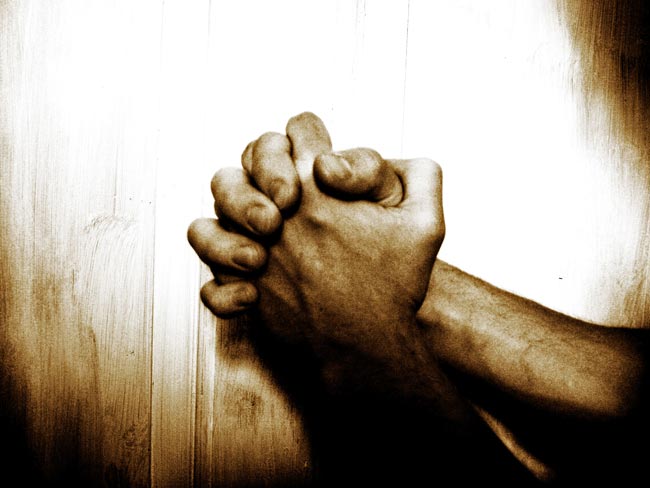
Religious Passion Tied to Higher Blood Pressure

Praying and believing in a god might secure a healthier existence for your soul in the hereafter, but it doesn't necessarily do much for the body in this life, a new study shows.
Religiosity appears to have little affect on preventing hypertension, or high blood pressure, and those study participants proclaiming to be the most religious were actually the most likely to have hypertension. The study was conducted by medical students at the Loyola University Chicago Stritch School of Medicine and presented on April 30 at the meeting of the Society of Teachers of Family Medicine in New Orleans.
Although a small study presented at a small meeting, it is yet one more report that chisels away at the notion that prayer and belief alone offer significant health benefits.
Nearer, my God, to Thee
Many studies indeed have shown that those who attend weekly religious services or participate in church activities have at least marginally better health than non-participants. Yet these studies have focused primarily on physical participation: getting out of the house to a weekly service and being part of a community.
One of the so-called landmark studies establishing the link between religious participation and lower blood pressure was published in 2006 in Psychosomatic Medicine, based on the Third National Health and Nutrition Examination Survey (NHANES III) and involving more than 14,000 men and women.
Those attending weekly religious services had "somewhat lower adjusted hypertension prevalence," the authors of that study concluded. Note, however, that "somewhat" meant a mere 1.46 mm Hg in their systolic blood pressure reading. That would be the difference between a blood-pressure reading of, say, 141/90 versus 140/90.
Sign up for the Live Science daily newsletter now
Get the world’s most fascinating discoveries delivered straight to your inbox.
Marginally significant results aside, these earlier studies could not tease apart what it was about religion — the spiritual act of believing or the physical acts of participating and interacting with neighbors — that provided the purported benefit. [Thinking of God Calms Believers, Stresses Atheists]
Seek and ye shall find
The Loyola study focused more on the spiritual, not whether a person merely attends church but whether they "carry [their] religion over into all other dealings in life," as cited in the study. Those who were most religious in this regard were the least healthy in terms of high blood pressure.
Other recent studies have focused on spirituality, too, to see if that alone could lower blood pressure, perhaps through mechanisms such as stress reduction. Yet prayer and spirituality were associated with higher blood pressure in a study of more than 3,000 adults published in January 2009 in Social Science Medicine; and they offered no benefit for preventing hypertension for approximately 1,600 women in a study published in June 2009 in Annals of Behavioral Medicine.
Even a life of the cloth seems to provide little protection. The obesity rate among United Methodist clergy is 40 percent, about 10 percent higher than the national rate, as reported in the September 2010 issue of Obesity.
Meanwhile, just about anything that gets someone out of the house can be helpful. Playing bingo, for example, even in a non-religious setting, is associated with a 40-percent reduction in death risk and 65-percent reduction in disability among the elderly, according to a study published in June 2009 in the Archives of Internal Medicine.
Faith-based interventions
None of this should rule out the notion of faith-based health interventions. Local religious organizations can play a powerful role in health education and health screening and in encouraging their congregation to exercise more and to eat more healthfully. [7 Diet Tricks That Really Work ]
Dozens of such targeted programs have begun in recent years. One program, in Kansas City, aimed at African Americans, has so far led to significant weight loss for its overweight and obese participants, as reported in the May–June 2010 issue of the journal Diabetes Education.
Here, diet and exercise, and not prayer, were the central elements of success. No amount of standing and kneeling at church can compensate for a sprawling ham dinner, or other large meal, after services.
Christopher Wanjek is the author of the books "Bad Medicine" and "Food At Work." His column, Bad Medicine, appears regularly on Live Science.

Christopher Wanjek is a Live Science contributor and a health and science writer. He is the author of three science books: Spacefarers (2020), Food at Work (2005) and Bad Medicine (2003). His "Food at Work" book and project, concerning workers' health, safety and productivity, was commissioned by the U.N.'s International Labor Organization. For Live Science, Christopher covers public health, nutrition and biology, and he has written extensively for The Washington Post and Sky & Telescope among others, as well as for the NASA Goddard Space Flight Center, where he was a senior writer. Christopher holds a Master of Health degree from Harvard School of Public Health and a degree in journalism from Temple University.









